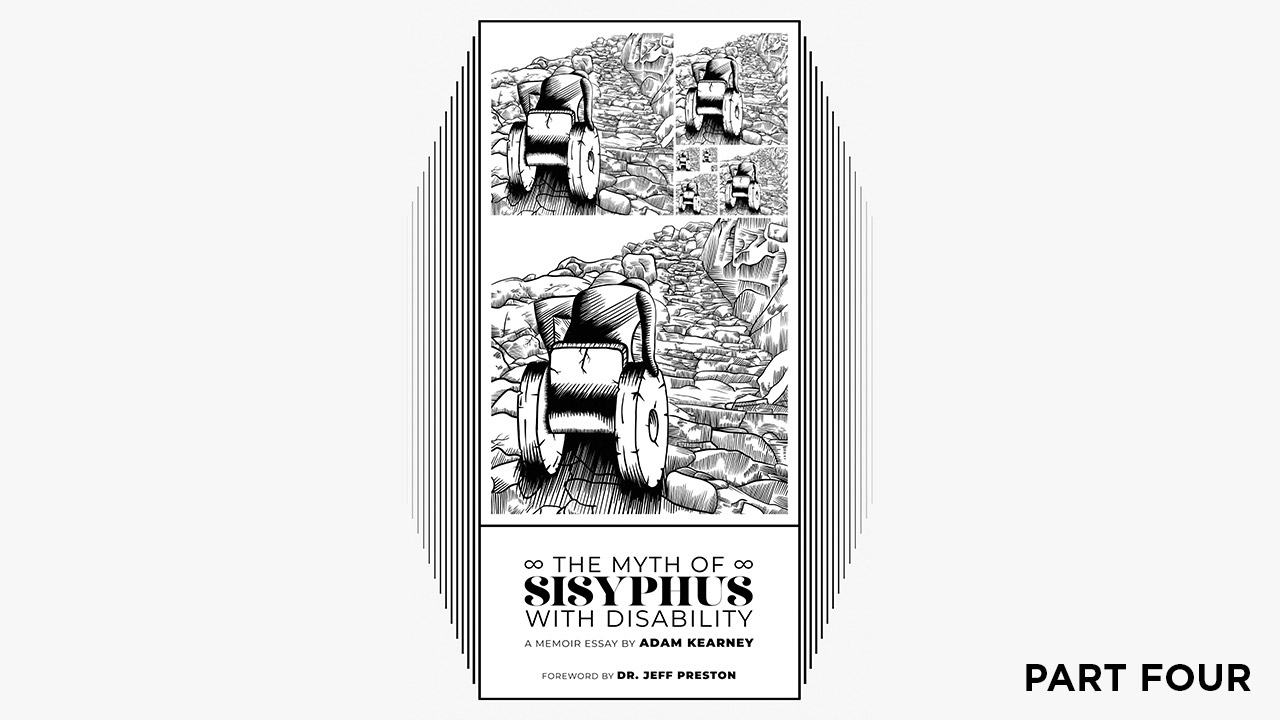The Myth of Sisyphus with Disability: Part Four
 CREDIT: COURTESY OF ADAM KEARNEY
CREDIT: COURTESY OF ADAM KEARNEYEvery time I have to explain why I have to do something differently because of disability...I start an uphill journey.
This article is the final part in a series of excerpts from Fanshawe grad Adam Kearney’s essay, The Myth of Sisyphus with Disability.
I stole the title of this essay, and the patch that I designed, from Camus’ essay, The Myth of Sisyphus, where he first introduced the philosophy of absurdism. Again, here I am going to use a quote by someone much more qualified to condense the themes of the essay, the Encyclopædia Britannica:
“Camus argues that life is essentially meaningless, although humans continue to try to impose order on existence and to look for answers to unanswerable questions. Camus uses the Greek legend of Sisyphus, who is condemned by the gods for eternity to repeatedly roll a boulder up a hill only to have it roll down again once he got it to the top, as a metaphor for the individual’s persistent struggle against the essential absurdity of life. According to Camus, the first step an individual must take is to accept the fact of this absurdity. If, as for Sisyphus, suicide is not a possible response, the only alternative is to rebel by rejoicing in the act of rolling the boulder up the hill. Camus further argues that with the joyful acceptance of the struggle against defeat, the individual gains definition and identity.”
If I follow in the same path as Sisyphus in the rejection of suicide (or MAiD), my only other option is to revolt. To kick back against the pricks. To claim my identity as a person with disability and fight back against the systems trying to maintain oppression over me.
Every time I have to disclose my disability and have conversations surrounding it. Every time I have to use google maps to see if a potential workplace is wheelchair accessible. Every time I have a fracture and have to rehabilitate from the injury. Every time someone asks “what’s wrong” with me. Every time I have to explain why I have to do something differently because of disability…I start an uphill journey. The difference between Sisyphus and I is that instead of pushing a boulder, I am pushing myself up that hill.
Sisyphus was given his task as punishment for cheating death, and some days it feels like that is what the disabled life experience is a series of tasks we are forced into because of our diagnoses. Perhaps, this is only because we have accepted society's view of ‘normalcy’ and imposed internalized ableism upon ourselves. What is collectively known as normalcy is a fallacy. We only harm ourselves by comparing ourselves to others. The only true normal is what we accept as truth for ourselves. Whatever you need to do to live a happy and healthy life is normal for you, and that is all that matters. If I continue to follow the same path as Sisyphus in the rejection of suicide (or MAiD) my only other option is to revolt. To kick back against the pricks. To claim my identity as a disabled person and fight back against the systems trying to maintain oppression over me.
We are at a critical time where our government cannot be relied upon to support our basic human rights. A large barrier keeping us from collectively raising our voices in opposition to systemic ableism is that we are already using so much energy just to meet our basic needs. There is a struggle on the daily, hourly and even minute by minute level that keeps most of us from organizing. I learned a great lesson from Leah Lakshmi Piepzna- Samarasinha’s book Care Work: Dreaming Disability Justice. That is the importance of communities focused on interdependent care. In a world where it is difficult to find allies, we need to find ways to be able to help one another. Even if it’s as simple as being there, listening to a friend vent their frustrations at you; this simple action can have tremendous results. The more we speak of our life experiences as people with disability, the more confident and accustomed we become asking for what we need, and what it is our right to have. We start to build back the confidence capitalism and ableism have worked so hard to strip us of.
Camus ends his essay with the lines, “The struggle itself toward the heights is enough to fill a man’s heart. One must imagine Sisyphus happy.” Though it is daunting, and at times seems as though I will never reach the summit of the hill I am on, I now understand I am not alone. Unlike in the story of Sisyphus, there are many other people pushing themselves up their own hills, just as I am doing. Though like all communities we struggle at times, there is still a tremendous power to be found in interdependence. In knowing we are not alone. In struggling together, when we have enough spoons to share. There is a great beauty to it, one that is unmatched in any other community I have found. It is here, in this space with acceptance of the absurd, that I am able to fill my heart.
This memoir essay was published as a zine in Nov. 2022. If you enjoy it and feel you would like to support the author, you can find a pay what you can PDF or purchase a physical copy at handcutcompany.com.















